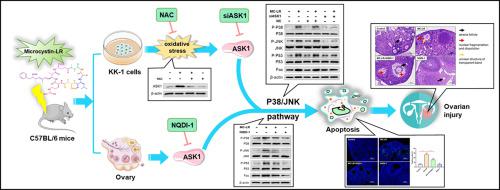Ecotoxicology and Environmental Safety ( IF 6.2 ) Pub Date : 2021-02-18 , DOI: 10.1016/j.ecoenv.2021.112066 Xingde Du , Haohao Liu , Xiaohui Liu , Xinghai Chen , Le Yuan , Ya Ma , Hui Huang , Yueqin Wang , Rui Wang , Shiyu Zhang , Zhihui Tian , Linjia Shi , Huizhen Zhang

|
As an emerging pollutant in the aquatic environment, microcystin-LR (MC-LR) can enter the body through multiple pathways, and then induce apoptosis and gonadal damage, affecting reproductive function. Previous studies focused on male reproductive toxicity induced by MC-LR neglecting its effects on females. The apoptotic signal-regulated kinase 1 (ASK1) is an upstream protein of P38/JNK pathway, closely associated with apoptosis and organ damage. However, the role of ASK1 in MC-LR-induced reproductive toxicity is unclear. Therefore, this study investigated the role of ASK1 in mouse ovarian injury and apoptosis induced by MC-LR. After MC-LR exposure, ASK1 expression in mouse ovarian granulosa cells was increased at the protein and mRNA levels, and decreased following pretreatment by antioxidant N-acetylcysteine, suggesting that MC-LR-induced oxidative stress has a regulatory role in ASK1 expression. Inhibition of ASK1 expression with siASK1 and NQDI-1 could effectively alleviate MC-LR-induced mitochondrial membrane potential damage and apoptosis in ovarian granulosa cells, as well as pathological damage, apoptosis and the decreased gonadal index in ovaries of C57BL/6 mice. Moreover, the P38/JNK pathway and downstream apoptosis-related proteins (P-P38, P-JNK, P-P53, Fas) and genes (MKK4, MKK3, Ddit3, Mef2c) were activated in vivo and vitro, but their activation was restrained after ASK1 inhibition. Data presented herein suggest that the ASK1-mediated P38/JNK pathway is involved in ovarian injury and apoptosis induced by MC-LR in mice. It is confirmed that ASK1 has an important role in MC-LR-induced ovarian injury, which provides new insights for preventing MCs-induced reproductive toxicity in females.
中文翻译:

微囊藻毒素-LR通过激活细胞凋亡信号调节激酶1介导的P38 / JNK途径诱导小鼠卵巢损伤和细胞凋亡
作为水生环境中新兴的污染物,微囊藻毒素-LR(MC-LR)可以通过多种途径进入人体,然后诱导细胞凋亡和性腺损害,从而影响生殖功能。先前的研究集中在由MC-LR引起的男性生殖毒性上,而忽略了其对女性的影响。凋亡信号调节激酶1(ASK1)是P38 / JNK途径的上游蛋白,与细胞凋亡和器官损伤密切相关。但是,ASK1在MC-LR诱导的生殖毒性中的作用尚不清楚。因此,本研究调查了ASK1在MC-LR诱导的小鼠卵巢损伤和细胞凋亡中的作用。暴露于MC-LR后,小鼠卵巢颗粒细胞中ASK1的表达在蛋白质和mRNA水平上均升高,并在抗氧化剂N-乙酰半胱氨酸预处理后降低,提示MC-LR诱导的氧化应激在ASK1表达中具有调节作用。siASK1和NQDI-1抑制ASK1表达可以有效减轻MC-LR诱导的卵巢颗粒细胞线粒体膜电位损伤和凋亡,以及C57BL / 6小鼠卵巢的病理损伤,凋亡和性腺指数降低。此外,P38 / JNK通路和下游凋亡相关蛋白(P-P38,P-JNK,P-P53,Fas)和基因(MKK4,MKK3,Ddit3,Mef2c)在体内和体外均被激活,但在ASK1抑制后它们的激活受到抑制。本文提供的数据表明,ASK1介导的P38 / JNK途径与小鼠MC-LR诱导的卵巢损伤和细胞凋亡有关。证实了ASK1在MC-LR诱导的卵巢损伤中具有重要作用,这为预防MCs诱导的女性生殖毒性提供了新的见识。









































 京公网安备 11010802027423号
京公网安备 11010802027423号